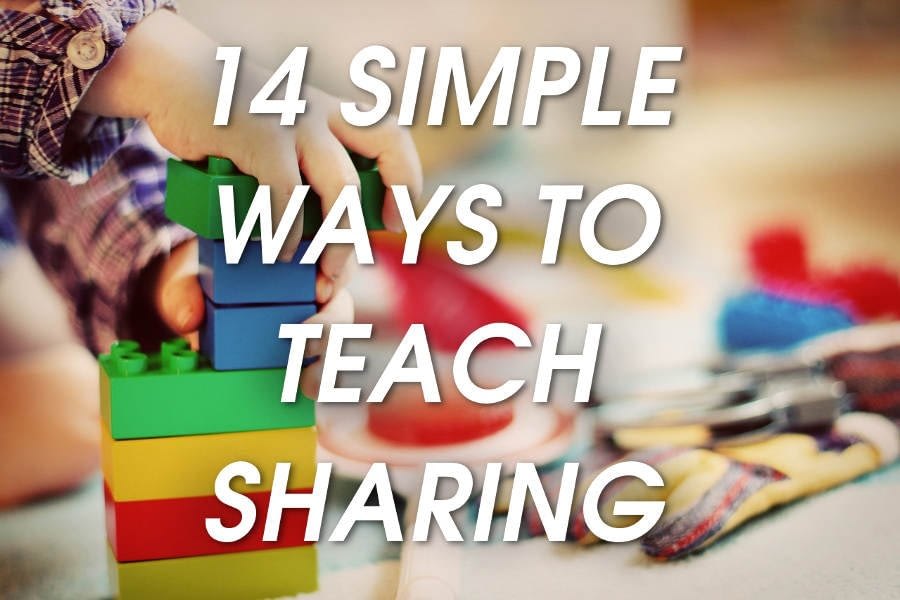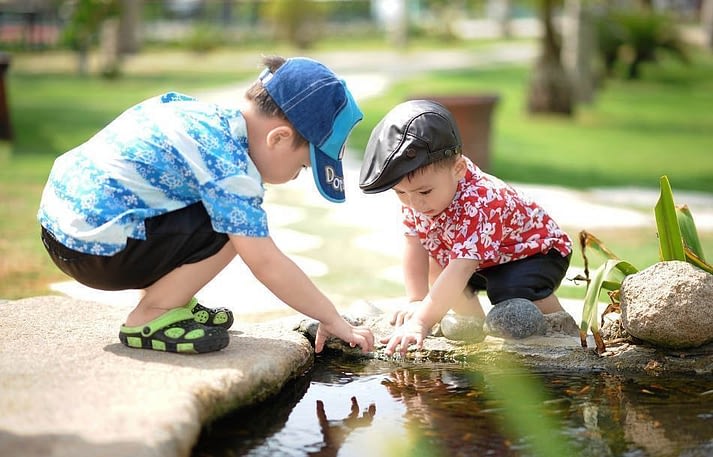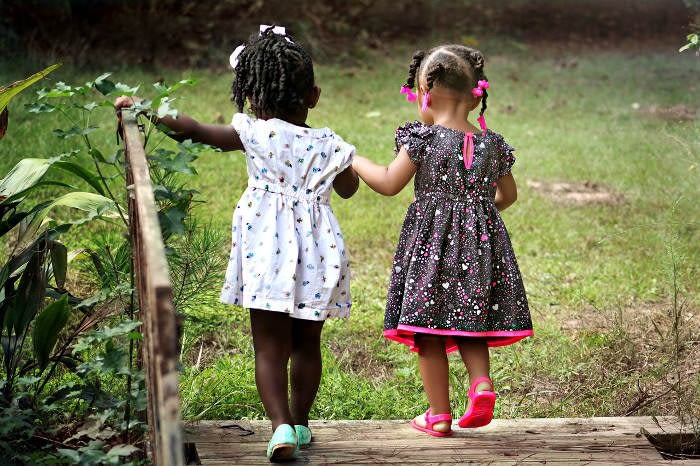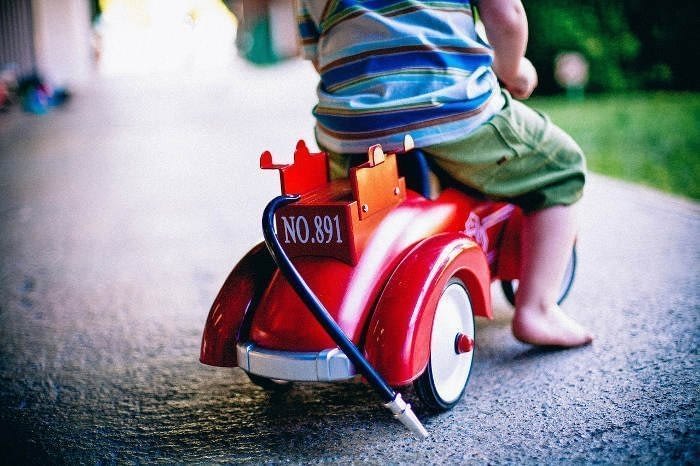14 EASY Ways to Teach Your 3-Year-old How to Love Sharing

And why the way I was forcing my 3-year-olds to share was holding them back.
| TEACH YOUR 3-YEAR-OLD TO LOVE SHARING – AT A GLANCE |
| Why forcing your 3 year old to share isn’t the answer |
| 14 Simple ways to teach your 3 year old how to share |
| Common Sharing Problems: A Walkthrough |
“Thump”. Followed by a few moments of silence. Then the tears started to flow. One of my daughters had toppled backward on the playmat. Up until that moment, both my 3-year-olds were wrestling over a single wooden spoon in front of their friends at the playgroup.
I picked her up as she bawled her eyes out. I tried to comfort her. Meanwhile, her twin on the floor was triumphantly playing with the wooden spoon that had caused all the fuss.
I didn’t like it when they fought over toys at home, but in front of a crowd, it was embarrassing. I always wondered why they were being so selfish with toys and thought it might be something I needed to help them with. I just didn’t know where to start. I had tried forcing them to share toys but it seemed to upset them and make them more possessive.
I was lost and confused about what to do. I knew I needed to do some research. To get to the bottom of how to teach my 3-year-olds how to share. What was the best and most effective method? Let me share it with you.
14 EASY WAYS TO TEACH YOUR 3-YEAR-OLD HOW TO SHARE
1. START EARLY
If your child has just turned 3 years old, they are actually at the start of their journey of learning to share. They won’t fully understand sharing until they are around 4-5 years old when they fully develop empathy for others. But right now is the perfect time to start teaching them and put them on the right path to become caring and sharing little 4-5-year-olds.
2. IT’S IN THE LANGUAGE YOU USE
“The largest increase seen in the physical act of sharing was with verbal training”1. The same study showed that language is very important to help 3-year-olds to understand sharing.
To take advantage of the benefits of verbal training try and use phrases like “Now it’s mommy’s turn, and now it’s Alice’s turn”. Rather than “my turn” or “your turn”. You need to make your words and meanings clear enough for a 3-year-old to understand.
3. PRACTICE TAKING TURNS
Introduce your 3-year-old to turn-taking types of games. This will allow them to practice sharing time, attention and items with others.
Patience and understanding of others’ feelings will be rewarded in these games. Remember to keep turns short as your 3-year-old has a limited attention span. Here are some examples of turn-based games to get you started:
- Copy the leader: Take turns in being the leader and perform an action like clapping, hopping, twirling, etc and the other players have to copy what you are doing. Then it is the next person’s turn to be the leader.
- Tower build: Build a tower together but take it in turns to place the blocks. You can help each other by discussing what blocks you think should go where? Big ones at the bottom? Or the top?
- Talent show: Take turns on the “stage” of your very own talent show! One person is the performer and the others are the audience. You can sing, dance, do acrobatics, tell a joke. Just remember to wait your turn if you are in the audience and clap loudly!
4. POSITIVE FEEDBACK
Give your 3-year-old plenty of positive praise when they share with others. This encourages positive reinforcement of the idea that sharing is good.
Positive guidance such as this is much more effective than negative methods such as pointing out their failures. Positive feedback helps build their self-esteem and makes them more likely to be generous in the future.
5. LEAD BY EXAMPLE
Monkey see Monkey do. Share with your child as much as possible and make examples of it. Then encourage your child to share with you. Don’t be discouraged if they don’t want to share with you at first. They are still learning the rules. Practice makes perfect.
For example, you could share parts of your food with them. Remember to emphasize the language of sharing. For example, “I would like to share some of this orange with you Bethany because it tastes so sweet and I think you might enjoy it”. Rather than “Do you want some of this orange?”.
6. TRY NOT TO GET OVERINVOLVED
If you see your 3-year-old arguing over a toy with another child, resist the temptation to get involved straight away. The best option would be to move closer so you can monitor the situation and intervene if it sounds like it is going down the wrong path. Give them the chance to work out their differences on their own.
Self-directed learning has the longest lasting value to your child. If you feel like the encounter is getting a little out of hand you could step in and try and suggest a solution to the children.
For example, “Why don’t we give Archie 5 more minutes to play with the car and then Ben can have his turn, is that fair?”
7. SET TIME LIMITS & GIVE REMINDERS
Sometimes, if your child has been given enough time or enough warning they might feel ready to share that toy. You can give a child a set time limit with a toy that you think they should share. Make sure you give them a few reminders when it is coming nearer to the time when they should share.
When it comes to the end of their turn, ask them to share the toy. Your 3-year-old is much more likely to share at this point because it is their choice and the request hasn’t come to them suddenly. They have had time to think about and process the situation.
8. COOPERATIVE GAMES
They teach great relationship building skills like working together. They also help your 3-year-old consider other people’s emotions and feelings.
Social games help them make new friends and they can also gain self-esteem from the feeling of contributing positively to a task. Here are some great cooperative games to get you started:
- Grocery store: Work together to run a little supermarket and take turns in being the customers. Make sure you have a checkout and lots of items to buy. Price up the items with labels and then calculated the customer’s total bill at the end. This game promotes working together to keep the customer happy and their shopping bags full!
- Balloon bat: Take a balloon and work as a team to bat it up into the air. Don’t let the balloon touch the floor for a set amount of time. If it does the whole team loses! This game promotes taking turns and working together to win.
- Gardening: Help each other to plant a sunflower in the garden. So you will need a pot, soil and the seed. Make sure you give the other gardeners help and advice in planting their seeds.
- Baking together: Work together to bake a cake. Take it in turns to add the ingredients and help cook the cake mixture. Then decorate the cake together. Then you can all help to eat the cake when it’s finished!
- Storytime: Take a piece of paper and help your 3-year-old write down the start of a story. Then fold that piece over, tell the next person the last line of what you have written and help them write the next part of the story.
After you have all had a turn, you will have an amazing surprise story that everyone worked together to write. The best part is nobody will have heard the story before and it should be very funny.
9. TALK ABOUT FEELINGS
If your child refuses to share when you think it is appropriate. Ask them why? How do they feel at that moment? What are the emotions that keep them from sharing? “Do you think you won’t get another turn?”
If you help them to recognize their own feelings then they will have an easier time learning to recognize others feelings. You should try to encourage your 3-year-old to see situations from someone else’s perspective.
10. FIND ITEMS THEY ARE COMFORTABLE SHARING
Every child has a favorite toy that is special to them. I wouldn’t expect my 3-year-olds to share their personal favorite toy. I have items that I own which I wouldn’t share with most people because they have incredible sentimental value to me.
So if a situation arises where your child has friends visiting. I usually put their special toys away. The ones I know they wouldn’t be comfortable sharing. On these days I make sure the toys that they play with are ones that my kids won’t mind sharing.
11. GIVE TO CHARITY
Make a positive example for your child by getting them to help you sort through your items and find things that you can give to charity/shelter. Remind them that it’s good to share with people that are in need. Thinking about others needs and sharing can make us feel happy.
12. BE GENEROUS
3-year-olds who have been on the receiving end of generosity are more likely to be generous themselves. Be generous towards your child and with other people in front of your child. Remember to use the language of sharing and emotion to teach your 3-year-old effectively.
For example, “I want to share half of my cookie with you because I know that it will make you happy”.
13. PRACTICE GIVING & RECEIVING
Research shows that children’s views on sharing are more positive if they “anticipate reciprocation”6. In simpler terms. This means that kids are more likely to share if they think they will get something in return. So make sure to remind your child of the benefits of sharing.
For example, if they share their drink with a sibling then the sibling might share their ice-cream back.
14. SPELL IT OUT
Research shows that 2-3-year-olds relied much more on explicit communicative cues to share resources with others5. To put that more simply, you have to give your 3-year-old gentle reminders of when to share, why we share and what benefits they might get if they do.
Your 3-year-old isn’t going to understand a complex idea like sharing in a few hours of teaching. You need to have patience and determination because your 3-year-old isn’t capable of learning this lesson quickly.

THE IMPORTANCE OF SHARING TO YOUR 3-YEAR-OLD
Difficulties with sharing are actually very common with 3-year-old children. At 3 years old they are just starting to understand the concept of sharing2.
I used to feel like a bad parent or embarrassed in front of others when one of my 3-year-olds refused to share. But It’s not a reflection of their character or your skill as a parent. It is part of their development. Another skill they have to learn.
It is important that we start to teach it to them now. So when they are 4-5 years old they can fully understand and benefit from the joys of sharing with others.
Sharing can be a strange idea to a 3-year-old.
Would you share your possessions with someone?How about some sugar if your neighbor needed it?What about sharing your hat with your neighbor? Or your shoes? And should you ask for the sugar back?
Sharing isn’t as easy to understand for our 3-year-olds as I first thought, especially when they lack the same emotional control as an adult.
It’s easy for them to trip over the many rules. That’s why we have to be there to guide them and teach them when to share and also when to stand up for themselves and say no.
At 3-years-old your child is discovering their independence. They are forming their own identity and learning that they are separate from other people. They have their own wills and wants. They realize that they can possess items, that toy can now be “mine”.
They have to balance this newfound independence with knowing when to share. Which is a very important skill for them to learn when they enter school and later in life.
In school, sharing will be encouraged and sometimes required. Sharing in school will help them form new relationships and friends. It will make them a positive part of the class. Now is the time to draw on your child’s kind-heartedness that they were born with and teach them about what they can get out of sharing.
“Preschool children understand the relation between generosity and happiness.”
— Paulus et al4.
So why can’t we step in and make our children share to teach them this important lesson? Because that isn’t the most effective way to teach them3, you want to reward them for making the choice to share. We have plenty of ways that we can encourage and praise them for making the right choices. Giving this trust to your 3-year-old and letting them make the decision will mean the lesson is thoroughly learned.

WHY FORCING YOUR 3-YEAR-OLD TO SHARE ISN’T THE ANSWER
“Now give your sister the toy, you need to learn to share, it’s her turn to play with it”
The reminders to share we give to our 3-year-olds are constant. I know I must have said that kind of sentence hundreds of times. Of course, I found that it’s very unlikely that they will just give the toy they are finding so interesting over to their sibling. I sometimes used to step in at this point and hand the toy over to her sister.
I thought I was doing the right thing.
But I was making it worse.
I always wondered why my 3-year-olds were still finding it difficult to share with each other, even after my constant reminders and intervening. That’s because forcing your 3-year-old to share isn’t the most effective way to teach them to share3. I know, it’s what every parent thinks is right or is encouraged to do, I thought the exact same thing. Now I know better, and I’d like to share that knowledge with you. So you can put your little ones on the road to generosity.
THE PROBLEMS WITH FORCED SHARING
- GIVE THEM THE OPPORTUNITY TO SHARE, BUT DON’T FORCE IT: Forcing a child to share a particular item or at a certain time might just be wrong. What if it is a cherished personal item of theirs? Like a favorite blanket or teddy?
Would you share your wedding band or your watch? If it is a less treasured item, maybe they are in the middle of exploring it and learning from it. If your child is forced to give up a toy just because another child asks for it is that a good example to set for your child? - YOUR 3-YEAR-OLD SHOULD CHOOSE TO SHARE: It should be your child’s choice to share for the learning experience to work best. If you force your child to share they will come away from the experience feeling resentful. If you let your child choose to share they come away from the experience feeling positive, happy and in control.
- DON’T ALWAYS GET INVOLVED: 3-year-olds need to start learning about and resolving their own conflicts and relationships. We can’t teach them everything.
They need to meet other children they disagree with and learn to stand up for their own interests. They will find that hard if you intervene every time you feel like there is going to be an argument. Requests for sharing from another child is a time for them to put into practice what you will teach them.
There are simpler, quicker and easier ways to teach your 3-year-old how to share and enjoy sharing. My girls now share with much less fuss and fighting and sometimes they share and resolve arguments without me even getting involved. That is because I found out, through my extensive research, the best ways to teach your 3-year-old how to share.
Let’s get to work on teaching your little ones right away.

COMMON SHARING PROBLEMS: A WALKTHROUGH
A 3-year-old becomes more generous because they experience the good feeling they get after giving to others. This experience must be chosen by the child. If you force a child to share, they are more likely to walk away from the experience resentful and less likely to want to share in the future.
I want to walk you through the two different options you have as a parent to approach the following problem:
Billy and Joe are brothers. Billy is playing with a toy car. It is a particularly loved toy by both boys and so is always in demand. Joe asks Billy if he can play with the toy car?
At this point, we have two different options we can take to solve this issue.
OPTION 1: We take the car away from Billy because he has been playing with it for some time and give the car to Joe so he can have his turn playing with it. We force Billy to share with his brother.
This teaches the brothers the following lessons:
- If I complain to a parent I can get what I want.
- Our parents decide who gets what toy and when. They can take away toys whenever they want.
- My parents listen to me more when I complain louder than my brother.
- I am in competition with my brother.
- The toy that I am playing with right now could be taken away from me at any time.
- I need to fight for the things I want.
Forced sharing brings up more negative emotions in your children than the positive emotion of sharing that you are trying to teach them. They feel insecure and resentful towards their siblings who they feel like they are in competition with. Which is stressful for them.
If you enforce this kind of forced sharing you are more likely to see a reluctance to share from your children because they feel resentful. Loud crying and complaining from your children to make decisions in their favor will be commonplace. It will produce a poorer relationship between siblings because they feel like they are in competition.
OPTION 2: You can tell Joe that he can ask Billy when he will be done with his turn playing with the car. You can tell Joe that you will help him wait until Billy is done playing with the car.
This teaches the brothers the following lessons:
- I am independent and I can ask my brother for what I want. I may not always get what I want right away but I will have my turn.
- I can be upset that I didn’t get to play with the car right away but this doesn’t mean I am given the car to stop me being upset.
- My parent can help me when I am upset or finding something difficult.
- I learn patience which is an important skill for when I grow up.
- The car is shared with my brother in a fair way.
- When it is my turn, I feel secure knowing that I can play with the car for however long I want.
- I decide when I give the car to my brother, that makes me feel good to see him enjoying playing with the car once I am done with it.
As you can see the second option is beneficial for both brothers. They learn new skills in negotiating with each other so it improves their relationship. They don’t have to run to a parent and make the biggest fuss they can so you will randomly decide to take a toy from their sibling.
They are developing the skills of patience and impulse control which are very important as they grow.
You are helping them to feel less stress and be more relaxed when they play. They know that nobody is going to remove their toy randomly, cutting short one of their imaginative play sessions.
You are reducing the feeling of competition between children which can be bad for their relationship. You are also giving them the power and independence to be generous and decide when to share with others and the happiness that can bring.
You are giving children the tools to manage their own conflict and problems they will no doubt encounter in life, rather than intervening in their learning of complex social skills that they need.
SUMMARY – THE KEY FACTS
- Learning to share is a vital skill in your child’s development. Their happiness in school and the ability to form good relationships and friendships depend on it.
- Forcing a child to share is an ineffective way of teaching generosity.
- Creating an environment where sharing is common and rewarded and letting them make the decision to share is the kind of self-directed learning that has the longest lasting value for your child.
- Lead by example. Share and be generous in front of them and they will notice.
- Be patient. At 3 years old children need frequent and clear reminders on how, when, and why we should share with others. Sharing isn’t a skill they will learn overnight.
- The language you use to teach your 3-year-old about sharing is very important. Make sure you are very clear about how sharing works. Sharing is difficult for a 3-year-old to understand.
- Ditch negative comments when your child doesn’t share and praise your child when they do. Positive reinforcement works a whole lot better than a telling off.
REFERENCES
1. Barton E, Ascione F. Sharing In Preschool Children: Facilitation, Stimulus Generalization, Response Generalization, And Maintenance. (1979). https://www.ncbi.nlm.nih.gov/pmc/articles/PMC1311427/pdf/jaba00106-0106.pdf
2. Brownell CA, Svetlova M, Nichols S. To share or not to share: When do toddlers respond to another’s needs?. Infancy. 2009.
3. Chernyak N, Kushnir T. Giving preschoolers choice increases sharing behavior. (2016). https://www.ncbi.nlm.nih.gov/pubmed/23955355
4. Paulus M, Moore C. Preschoolers’ generosity increases with understanding of the affective benefits of sharing. (2016) https://www.ncbi.nlm.nih.gov/pubmed/27256161
5. Wu Z, Su Y. How do preschoolers’ sharing behaviors relate to their theory of mind understanding?. (2014). https://www.ncbi.nlm.nih.gov/pubmed/24384326
6. Xiong M, Shi J, Wu Z, Zhang Z. Five-Year-Old Preschoolers’ Sharing is Influenced by Anticipated Reciprocation. Front Psychol. (2016). https://www.ncbi.nlm.nih.gov/pmc/articles/PMC4814498/

Leave a Reply